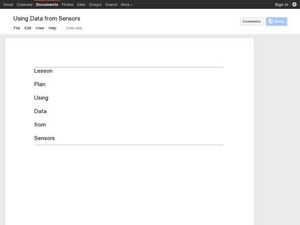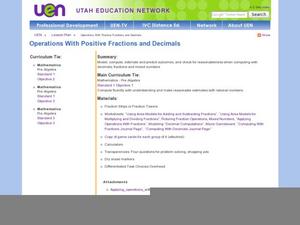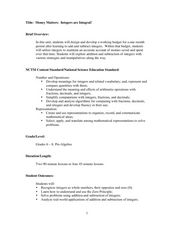Curated OER
Developing the Concept Division
Students use manipulatives to explain the concept of dividing multi-digit numbers.
Curated OER
Multiplication Two Digit by Three Digit Numbers
In this multiplication worksheet, students multiply two digit numbers by three digit numbers. Students complete 30 multiplication problems.
Curated OER
Multiplying Three Digit Numbers
In this multiplication worksheet, students multiply three digit numbers by three digit numbers. Students complete 24 multiplication problems.
Helping with Math
Subtraction: 4-digit numbers
Twenty four subtraction problems are displayed on this printable activity. All of the problems involve taking a four-digit number away from a greater four-digit number. Regrouping is required in some cases. This nifty homework assignment...
Helping with Math
Addition - Four 4-digit Numbers
Stack up those digits and get your fourth graders adding! This printable handout displays 20 addition problems in which pupils find the sum of four four-digit numbers. With a click of the box in the upper left corner of the web page,...
Curated OER
Using Data from Sensors
Beginning with a discussion about using technology to collect data, this resource includes a video about the next Mars rover as an example. Young scientists are taught that filtering is necessary before collected data can be analyzed....
Curated OER
Pizza Fractions
Everyone loves pizza! Learners define fractions and use manipulatives to calculate fractions. Kids cut circles to represent various fractional parts of a pizza. Some accommodations are included.
SurfScore
Kodable
Prepare young scholars for life in the twenty-first century with this introduction to computer coding formatted as a fun problem solving game, this resource is a great way to develop children's sequential thinking skills.
Curated OER
Multiplication Magic
Investigate multiplication problem solving strategies by working with base 10 blocks. Learners decompose problems with a Merlin the Magician theme. Multiple resources are provided.
Curated OER
Operations with Positive Fractions and Decimals
Explore the concept of fractions and decimals! In this fractions and decimals lesson, pupils use fraction tiles to express fractions. They play a fraction review basketball game where when a team gets a question correct they get to shoot...
Google
Surveys and Estimating Large Quantities
Looking for an estimation activity a bit more involved than the typical "guess the number of jellybeans in the jar" game? Here, learners use a picture to estimate the number of people at a large event, look for potential problems with...
EngageNY
The Power of Algebra—Finding Primes
Banks are responsible for keeping our financial information safe. Mathematics is what allows them to do just that! Pupils learn the math behind the cryptography that banks rely on. Using polynomial identities, learners reproduce the...
Code.org
Keys and Passwords
Scholars explore the relationship between cipher keys and passwords and as they learn more about the Vigenere cipher and continue to read from the book Blown to Bits in the seventh instructional activity of the series. They conduct an...
Buffalo State
Adding and Subtracting Positive and Negative Integers
A well-rounded unit on positive and negative integers is a great addition to your middle school math class. Learners work through five activities, each focused on a different skill, before playing a Game of Life to practice the...
Education Development Center
Adding Fractions with Unlike Denominators
If the fractions don't have a common denominator, make them have one. Learners first read and analyze a conversation of pupils trying to add 2/5 and 1/2. They compare the process of adding fractions to the process of adding quantities...
Curated OER
Problem Solvers
Fifth and sixth graders compare decimals to the place-value structure in the base-ten number system. They represent fractions as parts of unit wholes, as parts of a set, as locations on a number line, and as divisions of whole numbers....
National Security Agency
Money Maters: Integers are Integral!
A thoroughly-written lesson plan and a plethora of worksheets about integers comprise this resource. Neophyte number crunchers learn to recognize integers, add and subtract them, and apply the concepts to the designing of a personal...
Armory Center for the Arts
Place Value Collage
How can art represent math? Use a lesson on place value collages to illustrate the different meanings that numbers have in their designated places. Kids observe photographs and paintings that show place value, then work on their own.
Kenan Fellows
Dinner Party: Using Pattern Trains to Demonstrate Linear Functions
Nothing fancy here ... just your run-of-the-mill Algebra party! Learners explore the patterns of linear functions while designing seating arrangements for a dinner party. Comparing the number of tables to the perimeter of the combined...
Teach Engineering
The Fibonacci Sequence and Robots
What better way to introduce the idea of a sequence than with robots! An educational lesson explains the classic Fibonacci sequence before pupils build and program a robot to move. Additionally, the lesson challenges individuals to...
Illustrative Mathematics
Video Game Credits
Help your learners understand how to divide fractions with this visual activity. They first answer a simple inequality before dividing the fractions. Two solution choices are given to help your mathematicians understand how to solve "how...
Code.org
Practice Performance Task - Security and Hacking in the Real World
Young computer scientists create a visual artifact that represents their research into a computing innovation in the world of cybersecurity. They then work individually to write an essay on the impact of technology on cybersecurity.
Alabama Learning Exchange
Find a Pattern Using Children's Literature
Sixth graders listen to Demi's, On Grain of Rice: A Mathematical Folktale. They use the problem solving strategy of finding a pattern to determine the number of rice Rani will receive after 30 days. They create a spreadsheet which...
Curated OER
Cooking with Math
Fourth graders practice multiplication and division with cooking recipes. In this math lesson, 4th graders look at a recipe and change it so that it works for twice as many people or half as many people.

























